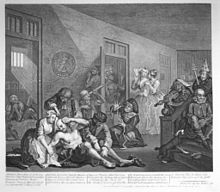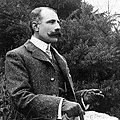Portal:England
The England portal

| |
England is a country that is part of the United Kingdom. The country is located on the island of Great Britain, of which it covers roughly 62%, and over 100 smaller adjacent islands. It has land borders with Scotland to the north and Wales to the west, and is otherwise surrounded by the North Sea to the east, the English Channel to the south, the Celtic Sea to the south-west, and the Irish sea to the west. Continental Europe lies to the south-east, and Ireland to the west. The population was 56,490,048 at the 2021 census. London is both the largest city and the capital.
The area now called England was first inhabited by modern humans during the Upper Paleolithic, but takes its name from the Angles, a Germanic tribe who settled during the 5th and 6th centuries. England became a unified state in the 10th century and has had a significant cultural and legal impact on the wider world since the Age of Discovery, which began during the 15th century. The Kingdom of England, which included Wales after 1535, ceased being a separate sovereign state on 1 May 1707 when the Acts of Union put the terms agreed in the Treaty of Union the previous year into effect; this resulted in a political union with the Kingdom of Scotland that created the Kingdom of Great Britain.
England is the origin of many well known worldwide exports, including the English language, the English legal system (which served as the basis for the common law systems of many other countries), association football, and the Church of England; its parliamentary system of government has been widely adopted by other nations. The Industrial Revolution began in 18th-century England, transforming its society into the world's first industrialised nation. England is home to the two oldest universities in the English-speaking world: the University of Oxford, founded in 1096, and the University of Cambridge, founded in 1209. Both universities are ranked among the most prestigious in the world.
England's terrain chiefly consists of low hills and plains, especially in the centre and south. Upland and mountainous terrain is mostly found in the north and west, including Dartmoor, the Lake District, the Pennines, and the Shropshire Hills. The country's capital is London, the greater metropolitan of which has a population of 14.2 million as of 2021, representing the United Kingdom's largest metropolitan area. England's population of 56.3 million comprises 84% of the population of the United Kingdom, largely concentrated around London, the South East, and conurbations in the Midlands, the North West, the North East, and Yorkshire, which each developed as major industrial regions during the 19th century. (Full article...)

Gropecunt Lane (/ˈɡroʊpkʌnt/) was a street name found in English towns and cities during the Middle Ages, believed to be a reference to the prostitution centred on those areas; it was normal practice for a medieval street name to reflect the street's function or the economic activity taking place within it. Gropecunt, the earliest known use of which is in about 1230, appears to have been derived as a compound of the words grope and cunt. Streets with that name were often in the busiest parts of medieval towns and cities, and at least one appears to have been an important thoroughfare.
Although the name was once common throughout England, changes in attitude resulted in its replacement by more innocuous versions such as Grape Lane. A variation of Gropecunt was last recorded as a street name in 1561. (Full article...)Selected article -

The Natural History Museum in London is a museum that exhibits a vast range of specimens from various segments of natural history. It is one of three major museums on Exhibition Road in South Kensington, the others being the Science Museum and the Victoria and Albert Museum. The Natural History Museum's main frontage, however, is on Cromwell Road.
The museum is home to life and earth science specimens comprising some 80 million items within five main collections: botany, entomology, mineralogy, palaeontology and zoology. The museum is a centre of research specialising in taxonomy, identification and conservation. Given the age of the institution, many of the collections have great historical as well as scientific value, such as specimens collected by Charles Darwin. The museum is particularly famous for its exhibition of dinosaur skeletons and ornate architecture—sometimes dubbed a cathedral of nature—both exemplified by the large Diplodocus cast that dominated the vaulted central hall before it was replaced in 2017 with the skeleton of a blue whale hanging from the ceiling. The Natural History Museum Library contains an extensive collection of books, journals, manuscripts, and artwork linked to the work and research of the scientific departments; access to the library is by appointment only. The museum is recognised as the pre-eminent centre of natural history and research of related fields in the world. (Full article...)General images

Insanity in English law is a defence to criminal charges based on the idea that the defendant was unable to understand what he was doing, or, that he was unable to understand that what he was doing was wrong.
The defence comes in two forms; where the defendant claims he was insane at the time of the crime, and where the defendant asserts he is insane at the time of trial. In the first situation, the defendant must show that he was either suffering from a disease which damaged the functioning of the mind and led to a defect of reason that prevented him from understanding what he was doing, or that he could not tell that what he was doing was wrong. In the second situation, the test is whether or not the defendant can differentiate between "guilty" and "not guilty" verdicts, instruct counsel and recognise the charges he is facing. If successful, he is likely to be detained under the Criminal Procedure (Insanity) Act 1964, although judges have a wide discretion as to what to do. (Full article...)Did you know?
- ...that the HMS Queen (1902) was fitted with Babcock and Wilcox cylindrical boilers due to service problems with the water service boilers?
- ...that the Charter Roll is the administrative record created by the medieval office of the chancery that recorded all the charters issued by the chancery?
- ...that Canterbury in eastern Kent was abandoned at the end of the Roman period, but was resettled by the Saxons?
- ...that English singer-songwriter Robbie Williams has sold more albums in the United Kingdom than any other British solo artist in history?
In the news

- 17 April 2024 –
- Scientists announce that they have identified fossil remains of the Ichthyotitan, the largest marine reptile currently known, in the Westbury Formation in England. (NOS)
Selected featured content
Categories
Selected quotes
| “ | An Englishman, even if he is alone, forms an orderly queue of one. | ” |
Related WikiProjects
England • Bedfordshire • Brighton • Cheshire • Cornwall • Derbyshire • Dorset • Greater Manchester • Hampshire • Lincolnshire • London • Merseyside • Northamptonshire • North East England • Sheffield • Surrey. Warwickshire • West Midlands • Worcestershire • Yorkshire
Topics
Things you can do

- Please visit the English Wikipedians' notice board and help to write new England-related articles, and expand and improve existing ones.
- Visit Wikipedia:WikiProject England/Assessment, and help out by assessing unrated English articles.
- Add the Project Banner to English articles around Wikipedia.
- Check for announcements and open tasks for ways to improve English related articles.
- Help nominate and select new content for the England portal.
- Requested articles: Charterhouse Lane • Renewable energy in England • Ealing Village
- Expand: Dorothy Boyd • David Troughton
Related Portals
 |
 |
 |
 |
 |
 |
 |
 |
| East Midlands | London | North East | North West | South East | South West | West Midlands | Yorkshire and the Humber |

|

|

|

|

|
| Ireland | Northern Ireland | Scotland | United Kingdom | Wales |
Associated Wikimedia
The following Wikimedia Foundation sister projects provide more on this subject:
-
Commons
Free media repository -
Wikibooks
Free textbooks and manuals -
Wikidata
Free knowledge base -
Wikinews
Free-content news -
Wikiquote
Collection of quotations -
Wikisource
Free-content library -
Wikiversity
Free learning tools -
Wikivoyage
Free travel guide -
Wiktionary
Dictionary and thesaurus










![Image 8The Staffordshire Hoard is the largest hoard of Anglo-Saxon gold and silver metalwork yet found[update]. It consists of almost 4,600 items and metal fragments. (from Culture of England)](http://upload.wikimedia.org/wikipedia/commons/thumb/6/60/Staffordshire_hoard_annotated.jpg/120px-Staffordshire_hoard_annotated.jpg)

























































































